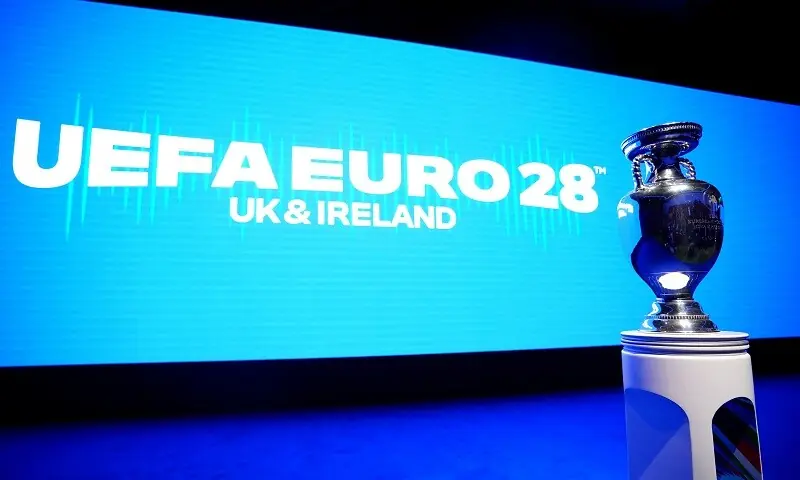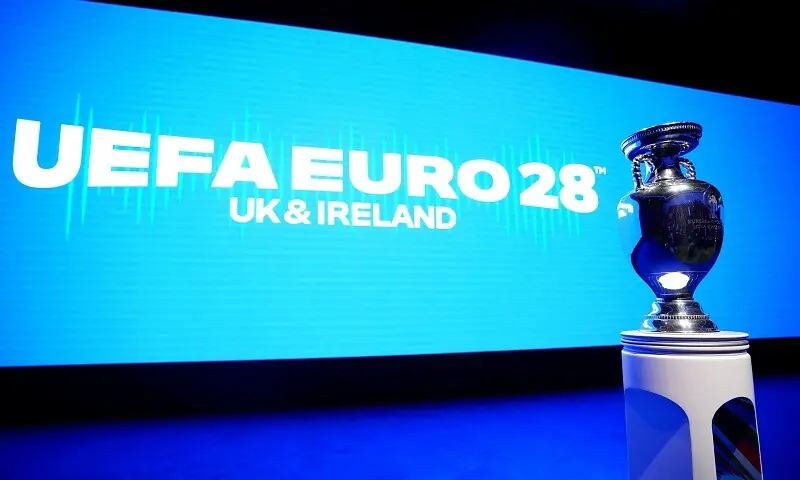
Cardiff will host the opening match of the 2028 European Championship on June 9, with the final scheduled for London’s Wembley Stadium on July 9, tournament organisers UEFA announced on Wednesday.
The tournament, co-hosted by England, Scotland, Wales and Ireland, will feature 51 matches involving 24 nations across nine venues in eight cities, also including Birmingham, Dublin, Glasgow, Liverpool, Manchester and Newcastle.
The semi-finals and one quarter-final will also be held at Wembley, while the other last-eight matches will be staged in Dublin, Glasgow and Cardiff.
Matches in the round of 16 will be distributed across all host venues, with the exception of Wembley. Host nations that qualify for the tournament directly will see their group-stage matches played on home soil.
“At UEFA EURO 2028, we will all speak football loud, clear and united,” UEFA President Aleksander Ceferin said in a statement. “The host nations, where the game first took shape, are eager to welcome millions of fans into legendary stadiums…
“In the way matches are staged including a new, more convenient kick-off time for the final … we want to maximise the fan experience.”
UEFA has confirmed three kick-off times for the tournament: 1400 GMT, 1700 GMT and 2000 GMT.
The final was confirmed as a 1600 GMT kick-off — three hours earlier than the Euro 2020 final at Wembley which became infamous for the chaotic scenes outside the stadium as ticketless supporters tried to force entry.
The tournament is projected to generate 3.6 billion pounds ($4.83 billion) in socio-economic benefits for the UK and Ireland between 2028 and 2031, according to an independent assessment, UEFA said.
These benefits include job creation, regional prosperity and spending from international visitors.
The UK Government, Scottish Government, Welsh Government and Government of Ireland have collectively pledged up to 740 million pounds ($993.15 million) in funding to ensure the “event is safe, secure and offers a world-class experience” for fans and host communities alike.
“The scale of the tournament will have a really positive impact on communities throughout the country,” England FA CEO Mark Bullingham said. “This will be a tournament for the fans, with their experience at the heart of our planning.”
In May, Europe’s football governing body UEFA said England, Ireland, Scotland and Wales would participate in qualifying for Euro 2028, but there will be two places reserved for any that fail to either win their group or finish as one of the eight best runners-up.
England finished runners-up at Euro 2024 while Scotland were knocked out in the group stage. Wales and Ireland did not qualify for last year’s tournament hosted by Germany.
England set for Etihad start
England will play their first match of Euro 2028 at Manchester City’s Etihad Stadium, it was announced during Wednesday’s tournament launch.
The launch in London, which included an unveiling of the match schedule, saw some speakers struggle to be heard as a small but noisy pro-Palestine protest took place directly outside the event, with demonstrators chanting against Israel’s continued membership of UEFA, the governing body of European football.
Organisers announced England would open their campaign at the Etihad before playing their final two group games at London’s Wembley Stadium if they qualify directly.
England would play at Newcastle’s St James’ Park if they won Group B, before returning to Wembley for the rest of the tournament.
If England, who have not won a major men’s international football tournament since beating the then West Germany in the 1966 World Cup final at Wembley, finish second in the group they will travel head to Everton’s Hill Dickinson Stadium for the last 16, before going on to the Principality Stadium.
England and Wales could meet in a Wembley quarter-final if both teams win their groups.
Debbie Hewit, the chair of both England’s Football Association and UK and Ireland 2028 Ltd, promised the “best-ever” Euro.
Belfast has been chosen to host the Euro 2028 qualifying draw, scheduled to take place in Northern Ireland’s capital on December 6, 2026.—Agencies


